Serving 885 students in grades Prekindergarten-8, P.s. 207 Elizabeth G Leary ranks in the top 50% of all schools in New York for overall test scores (math proficiency is bottom 50%, and reading proficiency is bottom 50%).
The percentage of students achieving proficiency in math is 45% (which is lower than the New York state average of 46%). The percentage of students achieving proficiency in reading/language arts is 57% (which is higher than the New York state average of 49%).
The student:teacher ratio of 14:1 is higher than the New York state level of 11:1.
Minority enrollment is 72% of the student body (majority Black and Asian), which is higher than the New York state average of 60% (majority Hispanic and Black).
Quick Stats (2025)
- Grades: Prekindergarten-8
- Enrollment: 885 students
- Student:Teacher Ratio: 14:1
- Minority Enrollment: 72%
- Overall Testing Rank: Top 50% in NY
- Math Proficiency: 45% (Btm 50%)
- Reading Proficiency: 57% (Top 50%)
- Science Proficiency: 80-84% (Top 50%)
- Source: National Center for Education Statistics (NCES), NY Dept. of Education
Top Rankings
P.s. 207 Elizabeth G Leary ranks among the top 20% of public schools in New York for:
Category
Attribute
Diversity
School Overview
P.s. 207 Elizabeth G Leary's student population of 885 students has declined by 23% over five school years.
The teacher population of 63 teachers has declined by 24% over five school years.
Grades Offered
Grades Prekindergarten-8
(offers virtual instruction)
(offers virtual instruction)
Total Students
885 students
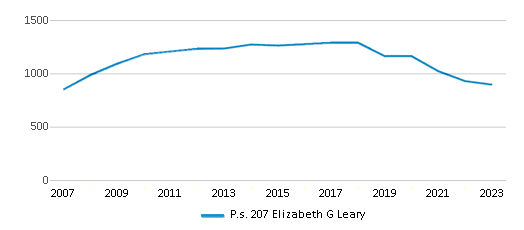
Gender %
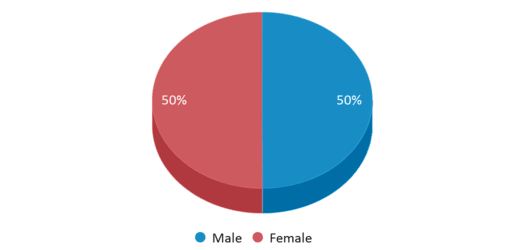
Total Classroom Teachers
63 teachers
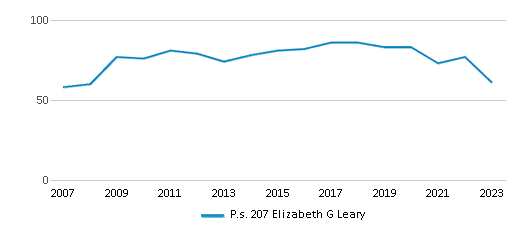
Students by Grade
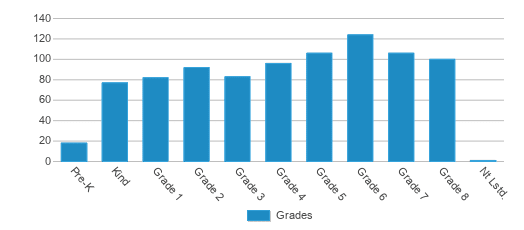
School Rankings
P.s. 207 Elizabeth G Leary ranks within the top 50% of all 4,377 schools in New York (based off of combined math and reading proficiency testing data).
The diversity score of P.s. 207 Elizabeth G Leary is 0.77, which is more than the diversity score at state average of 0.72. The school's diversity has stayed relatively flat over five school years.
Overall Testing Rank
#1747 out of 4377 schools
(Top 50%)
(Top 50%)
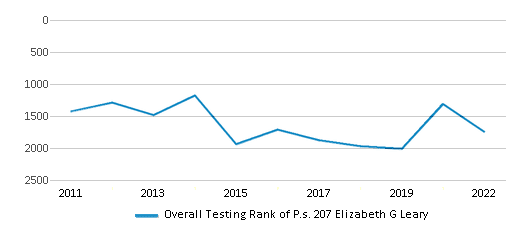
Math Test Scores (% Proficient)
45%
46%
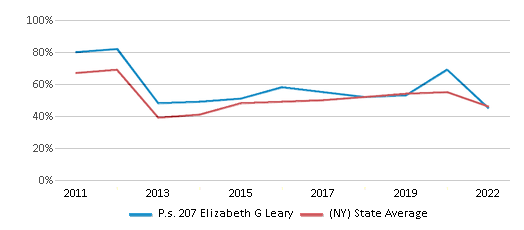
Reading/Language Arts Test Scores (% Proficient)
57%
49%
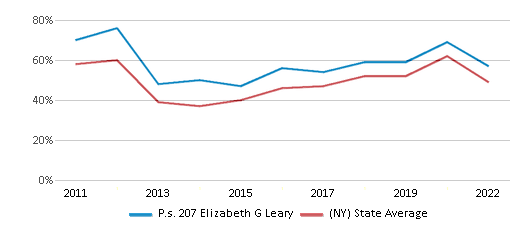
Science Test Scores (% Proficient)
80-84%
78%
Student : Teacher Ratio
14:1
11:1
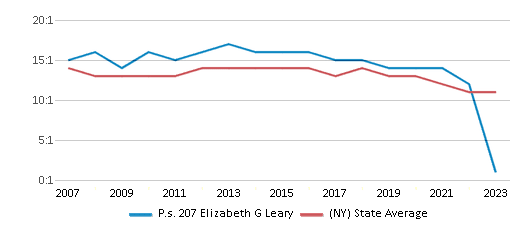
American Indian
1%
1%
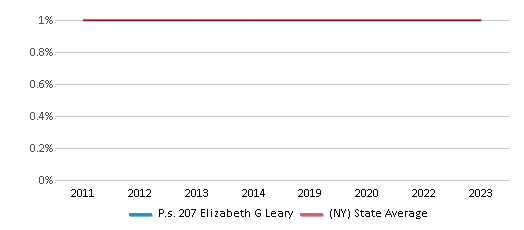
Asian
24%
10%
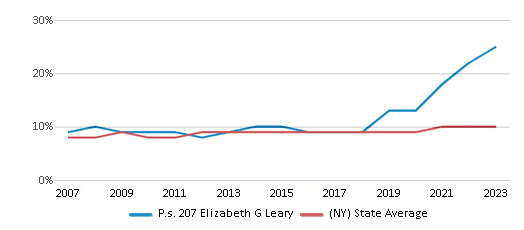
Hispanic
15%
30%
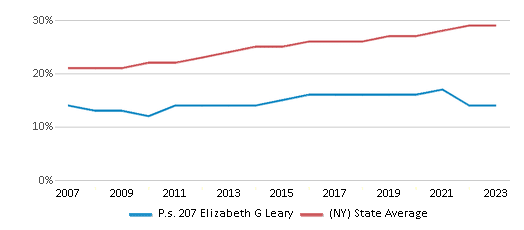
Black
28%
16%
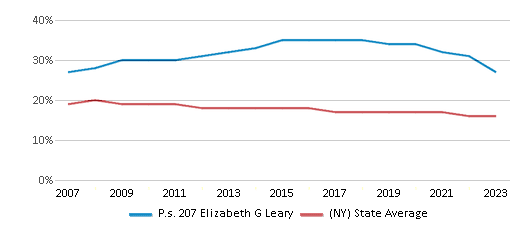
White
28%
40%
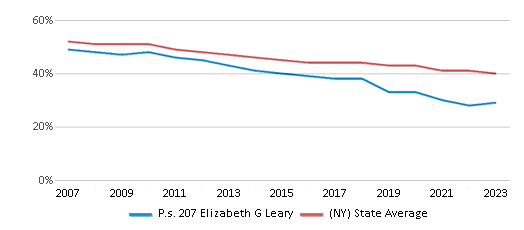
Hawaiian
n/a
n/a
Two or more races
4%
3%
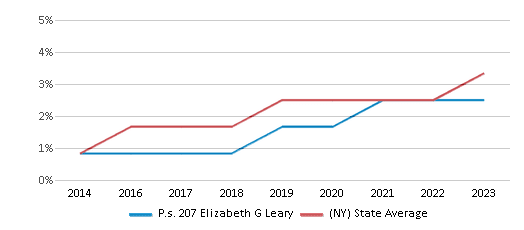
All Ethnic Groups
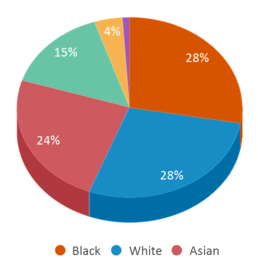
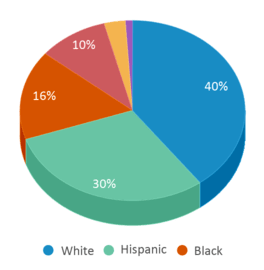
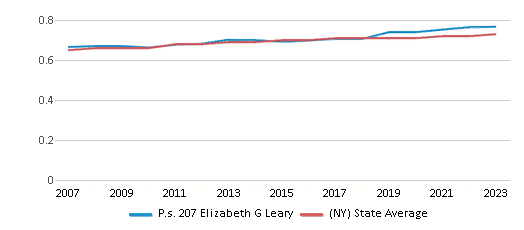
Participates in the National School Lunch Program (NSLP)
Yes
Eligible for Free Lunch
51%
54%
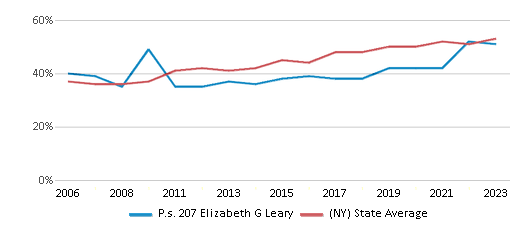
Eligible for Reduced Lunch
3%
3%
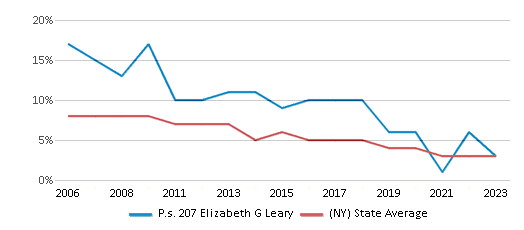
School Statewide Testing
School District Name
Source: National Center for Education Statistics (NCES), NY Dept. of Education
Profile last updated: 02/09/2025
Frequently Asked Questions
What is P.s. 207 Elizabeth G Leary's ranking?
P.s. 207 Elizabeth G Leary is ranked #1747 out of 4,377 schools, which ranks it among the top 50% of public schools in New York.
What schools are P.s. 207 Elizabeth G Leary often compared to?
P.s. 207 Elizabeth G Learyis often viewed alongside schools like P.s. 222 Katherine R Snyder, P.s. 236 Mill Basin by visitors of our site.
What percent of students have achieved state testing proficiency in math and reading?
45% of students have achieved math proficiency (compared to the 46% NY state average), while 57% of students have achieved reading proficiency (compared to the 49% NY state average).
How many students attend P.s. 207 Elizabeth G Leary?
885 students attend P.s. 207 Elizabeth G Leary.
What is the racial composition of the student body?
28% of P.s. 207 Elizabeth G Leary students are Black, 28% of students are White, 24% of students are Asian, 15% of students are Hispanic, 4% of students are Two or more races, and 1% of students are American Indian.
What is the student:teacher ratio of P.s. 207 Elizabeth G Leary?
P.s. 207 Elizabeth G Leary has a student ration of 14:1, which is higher than the New York state average of 11:1.
What grades does P.s. 207 Elizabeth G Leary offer ?
P.s. 207 Elizabeth G Leary offers enrollment in grades Prekindergarten-8 (offers virtual instruction).
What school district is P.s. 207 Elizabeth G Leary part of?
P.s. 207 Elizabeth G Leary is part of New York City Geographic District #22 School District.
In what neighborhood is P.s. 207 Elizabeth G Leary located?
P.s. 207 Elizabeth G Leary is located in the Marine Park neighborhood of Brooklyn, NY. There are 2 other public schools located in Marine Park.
School Reviews
3 12/14/2020
These parents are bitter and complain too much....the school is wonderful in preparing the students for the future... gifted or not. Regents are offered to CIG students because they meet the requirements to take the regents and not for any other reason.... this is reality.... sour grapes.
5 6/30/2018
This ischool is one of the best public schools in the city. They have excellent extra curricula opportunities for students like band, music, chorus, glee club, chess clib, Art prpgram, just to name a few. The curriculum is great, and the students' achievement is on the high side of thr city's average. There's plenty of ways for parents to vet involved. The PTA and Administrators appear to have a very good relationship. It's an organized and well managed school. The entire community works together.
2 6/21/2010
School is not parent friendly. Gifted or not, if a problem occurs, school administrators become cold and unattentive. Administration cares about getting an A rating and not about their individual students..
School has a good art teacher, but due to scheduling conflicts with Fillmore Academy, many 207 classes do not get Art..There is a poor music program, chorus, band and recorder because they lack good teachers...
Gym teachers from both 207 and Fillmore Academy are great, but due to scheduling conflicts, the elementary grades do gym in the auditorium throughout the winter.
PTA is just a fundraising machine..unwelcoming and does not give back to the students, such as supplying water and snacks during outdoor festivities for free..
2 2/8/2010
If your child is gifted, not a problem. You will have the red carpet treatment. If you child is not gifted or even special ed, you get no treatment at all. There is no extracurricular activities for regular students. There is theatre & newspaper, but only the gifted students has access to them. If you go to the open house for Fillmore Academy (6-8) you get the tour from only the gifted students. The regents for the 8th graders are only given to the CIG students. The principal does not want her grades to go down. There are no lockers, so your child must carry around 25 lbs of books on their backs, all day long. Award ceremonies are for the gifted students. No other student will ever receive an award for anything. Don't know if there are any athletic awards. Probably not. There is a lot of parental involvement. There is a strong PTA in place. Unfortunately is is also very clicky. All you need to do is stand in the schoolyard & figure out who is in & who isn't. I have been in the school for a few years & I talk from experience.
Review P.s. 207 Elizabeth G Leary. Reviews should be a few sentences in length. Please include any comments on:
- Quality of academic programs, teachers, and facilities
- Availability of music, art, sports and other extracurricular activities
Recent Articles

What Is A Charter School?
Explore the world of charter schools in this comprehensive guide. Learn about their history, how they operate, and the pros and cons of this educational innovation. Discover key facts about charter schools, including admission policies, demographics, and funding, as well as what to look for when considering a charter school for your child.

10 Reasons Why High School Sports Benefit Students
Discover the 10 compelling reasons why high school sports are beneficial for students. This comprehensive article explores how athletics enhance academic performance, foster personal growth, and develop crucial life skills. From improved fitness and time management to leadership development and community representation, learn why participating in high school sports can be a game-changer for students' overall success and well-being.

February 05, 2025
Understanding the U.S. Department of Education: Structure, Impact, and EvolutionWe explore how the Department of Education shapes American education, from its cabinet-level leadership to its impact on millions of students, written for general audiences seeking clarity on this vital institution.





